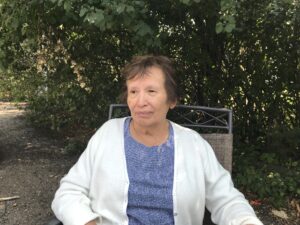
We will heal our country by first healing ourselves.
Mona Miyasato is the archetype I came on this journey to find. She is a Dakota elder and life-long educator. Now 80, she describes herself as growing up “aculturated” to the dominant, or White, society. Mona’s father was a child around the time of the last Lakota/US Army battles on the northern plains. She grew up in eastern South Dakota on a small reservation and her father taught them to live with one foot in both the White and Lakota worlds.
“We don’t even talk about values. Back then, we talked about a way of life, how they lived, how other people lived. Those ways of living were so instilled into my father by his grandma that he hung onto them.”
“My father was taught not formally, but simply by living with his grandma. She didn’t really teach him anything. She just was what she was, and he picked up on it.”
“He saw the good in everything, absolutely everything. It could be a snake, you know, it could be things like the sun.”
“He attended Carlisle, one of the worst education experiences of all of the early boarding schools. They tried to kill the Indian to save the man. And that didn’t seem to faze him. He never had anything bad to say about the school. He only said all of the good things that he learned there.”
“My dad and my mom, they just really worked the land, loved the land. My dad was a hunter. We ate every kind of wild animal.”
“Our parents put such an emphasis on education, because he knew that we had to learn stuff to succeed in both worlds.”
“One of our sayings is, ‘Always remember you are Lakota’. It means our ancestors are with us; they’re always here. So we are not only the children, we are the ancestors. Being Lakota or Dakota, we have everything that they had. We can’t escape it. That’s who we are.”
“One time, we were out eating in Rapid City and we were sitting in this booth, and these people right behind us were talking us down, saying racist things; they knew that we could hear them. I was ready to fight, but my friend said, ‘You can’t change their thinking. We have balance; that’s one of our virtues.’ There are good people, and there are people who haven’t grown very much, and they’re considered the bad people. But without them, we can’t learn how to be a better relative. Having had that exposure to them and their thinking, their point of view, their way of thinking helps you to grow, to understand them, and so that’s the way nature is.”
“The number one thing to have is love. It’s just caring. My dad even had a deep love for animals. There was an owl who would perch on an old wheel in the yard and I think he and my dad talked to each other. One time he was teaching us how to hook a worm for fishing and I said, ‘Doesn’t that hurt the worm?’. And he said, ‘Of course it does. Just because he can’t talk or cry doesn’t mean he’s not hurt’.”
“One time on the Pine Ridge I wanted to make a special dish, and we need chokeberries, but I didn’t have any, so I went to my friend and she got a jar and gave it to me. But then she told me I need to be better prepared. She still gave me the chokeberries but she was reminding me of a key lesson of ours: be prepared to survive and take care of each other. She was scolding me in her own way so I could share with others as well.”
“I don’t think any people love and care about their families more than Indians. They know that this is sacred; they get it. They just don’t know how to act on it. They don’t know that it means staying home, not gambling, not drinking; your only job is to take care of your family, your kids. It isn’t that they don’t love; it’s that they don’t know how to care.”
“But more of them now go to the ceremonies and are learning the language. Hope is about loving yourself, and that is what has diminished in our people.”
“We know we can survive. We can go without water. We can go without healthy food for longer than anyone. We can find a way. We’ll be the last ones; we know how to take care of ourselves.”
“We will heal our country by first healing ourselves. You do that by learning and then you have something to offer; what you really offer is yourself. Sometimes it’s just smile. Sometimes it’s just a pat on the back, sometimes it’s a kind word. Those kinds of things, do more for people than you’ll ever know. You can be a good relative, and they’ll be a good relative to you in return, maybe not immediately. Not the kind of goodness you would like, or the goodness you give. I think that’s the only thing, because we can’t change society by ourselves. But we can do our part by being as good as we can be, and being as healthy as we can be.”











Leave A Comment